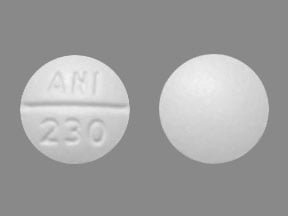
Propafenone Coupons & Savings Card – Discount Prices from $45.03
Propafenone, also known by its brand name Rythmol, is a medication used to address certain types of serious irregular heartbeats, such as atrial fibrillation and paroxysmal supraventricular tachycardia. As an antiarrhythmic drug, its primary purpose is to restore and maintain a regular heart rhythm, thereby reducing the risk of complications like blood clots, heart attacks, or strokes. This medication operates by blocking sodium channels, which are crucial for the heart's electrical activity, thereby slowing down abnormal signals that cause irregular heart rhythms. Propafenone is usually administered orally, with dosing frequency depending on whether the immediate-release or extended-release form is prescribed. While effective, it may not be suitable for individuals with structural heart diseases, such as heart valve issues. Common side effects include dizziness, chest pain, and difficulty breathing. Always consult with your healthcare provider to ensure this treatment is appropriate for your condition.
Our coupons are free to use. Before paying, show the pharmacist your Propafenone savings card to get your free discount. Use our filters below to edit the prescription box to match your needs. The Propafenone prices will update based on your prescription needs. Above our Propafenone coupons, you can change your location to see pharmacy prices and costs in other areas. We're here to help you buy Propafenone at the lowest price with our prescription discount card.
My prescription
Edit
150MG, Propafenone (270 Tablets)
Select pharmacy

CVS
$46.55
COUPON PRICE
Albertsons
$45.03
COUPON PRICE
Walgreens
$49.32
COUPON PRICE
Walmart
$57.11
COUPON PRICEPropafenone savings card
Show this card to your pharmacist
Albertsons
$45.03
BIN
ID
PCN
GRP
019876
LHCA5CD220
CHIPPO
LHX
Powered by
Propafenone, also known by its brand name Rythmol, is a medication used to address certain types of serious irregular heartbeats, such as atrial fibrillation and paroxysmal supraventricular tachycardia. As an antiarrhythmic drug, its primary purpose is to restore and maintain a regular heart rhythm, thereby reducing the risk of complications like blood clots, heart attacks, or strokes. This medication operates by blocking sodium channels, which are crucial for the heart's electrical activity, thereby slowing down abnormal signals that cause irregular heart rhythms. Propafenone is usually administered orally, with dosing frequency depending on whether the immediate-release or extended-release form is prescribed. While effective, it may not be suitable for individuals with structural heart diseases, such as heart valve issues. Common side effects include dizziness, chest pain, and difficulty breathing. Always consult with your healthcare provider to ensure this treatment is appropriate for your condition.
Our coupons are free to use. Before paying, show the pharmacist your Propafenone savings card to get your free discount. Use our filters below to edit the prescription box to match your needs. The Propafenone prices will update based on your prescription needs. Above our Propafenone coupons, you can change your location to see pharmacy prices and costs in other areas. We're here to help you buy Propafenone at the lowest price with our prescription discount card.
Related antiarrhythmics prescriptions
coupons from$30.74Save 62%
coupons from$42.68Save 83%
coupons from$6.74Save 83%
coupons from$26.04Save 74%
coupons from$591.39Save 72%
coupons from$30.85Save 21%
coupons from$172.32Save -34%
coupons from$11.26Save 89%
More prescriptions for ventricular arrhythmia
coupons from$26.04Save 48%
coupons from$6.74Save 90%
coupons from$249.96Save 60%
coupons from$66.15Save 38%
coupons from$6.74Save 90%
coupons from$9.16Save 99%
coupons from$241.99Save 69%
coupons from$926.77Save 14%
Related antiarrhythmics prescriptions
Flecainide Save 62%coupons from $30.74
Tikosyn Save 83%coupons from $42.68
Betapace Save 83%coupons from $6.74
Pacerone Save 74%coupons from $26.04
Sotylize Save 72%coupons from $591.39
Mexiletine Save 21%coupons from $30.85
Norpace Save -34%coupons from $172.32
Adenosine Save 89%coupons from $11.26
More prescriptions for ventricular arrhythmia
Amiodarone Save 48%coupons from $26.04
Sorine Save 90%coupons from $6.74
Norpace Cr Save 60%coupons from $249.96
Acebutolol Save 38%coupons from $66.15
Sotalol Save 90%coupons from $6.74
Quinidine Sulfate Save 99%coupons from $9.16
Quinidine Gluconate ER Save 69%coupons from $241.99
Betapace Af Save 14%coupons from $926.77
Propafenone dosage forms
Use our Propafenone 150MG coupon with prices from $45.03 for 270 Tablets. You can also use our Propafenone 150MG coupon with prices from $2.64 for 1 Tablet. We have a Propafenone 150MG coupon with prices from $16.06 for 100 Tablets. You can use our Propafenone 150MG coupon with prices from $48.36 for 300 Tablets.
Dosage Quantity Price from Per unit 150MG 270 Tablets $45.03 $0.17 150MG 1 Tablet $2.64 $2.64 150MG 100 Tablets $16.06 $0.16 150MG 300 Tablets $48.36 $0.16 225MG 60 Tablets $15.14 $0.25 225MG 100 Tablets $23.57 $0.24 225MG 180 Tablets $42.68 $0.24 225MG 300 Tablets $53.60 $0.18 300MG 100 Tablets $34.28 $0.34 300MG 270 Tablets $69.45 $0.26
| Dosage | Quantity | Price from | Per unit |
|---|---|---|---|
| 150MG | 270 Tablets | $45.03 | $0.17 |
| 150MG | 1 Tablet | $2.64 | $2.64 |
| 150MG | 100 Tablets | $16.06 | $0.16 |
| 150MG | 300 Tablets | $48.36 | $0.16 |
| 225MG | 60 Tablets | $15.14 | $0.25 |
| 225MG | 100 Tablets | $23.57 | $0.24 |
| 225MG | 180 Tablets | $42.68 | $0.24 |
| 225MG | 300 Tablets | $53.60 | $0.18 |
| 300MG | 100 Tablets | $34.28 | $0.34 |
| 300MG | 270 Tablets | $69.45 | $0.26 |
